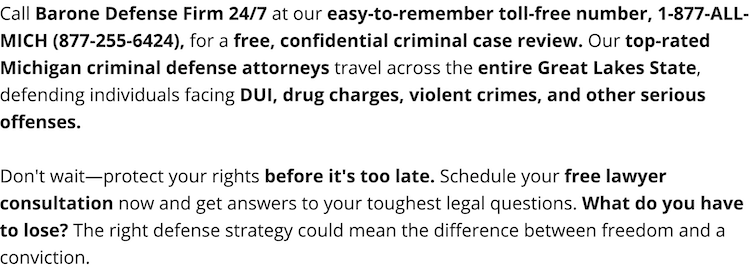5th Offense Felony DUI Reduced – Jail Time Avoided in Oakland County
People facing second and third offense drunk driving charges in Michigan are at serious risk of being sent to jail if convicted. The risk of jail time skyrockets when someone is facing a third offense felony because a third offense felony Operating While Intoxicated (OWI) charge in Michigan carries with it a mandatory minimum of 30 days in jail. Predictably, someone facing a fourth offense, fifth offense, or higher, can almost always bet on spending significant time in jail.
In Michigan, the “highest” drunk driving offense, not including cases involving serious injury or death, is call OWI 3rd offense. Michigan also have lifetime look-back, meaning anyone arrested for drunk driving with two priors any time in their life is looking at an OWI 3rd offense felony charge. If a person has more than 2 prior drunk driving convictions, each additional conviction will skew the sentencing guidelines upward, thereby increasing the minimum allowable sentence.
This was the risk facing a recent client of the top rated Michigan DUI Defense Lawyers at the Barone Defense Firm. Our client in this case was a FINRA-licensed financial professional with a very large book of business. This book of business, the result of decades of hard work, would’ve been lost if our client was convicted of a felony because the client’s FINRA licensing would have been suspended. This is what we call a collateral consequence of an OWI conviction; a consequence that happens because of a conviction but not directly handed down by the court. In addition to the potential for a felony and jail time, these potential consequences naturally made it feel like our client’s life was on the line. And our mission statement is to help our clients win back their lives, so we did what we always do, we went to work.
This case originated from an incident that occurred in Oakland County. Our client was sleeping in his vehicle in a parking lot with his keys in the car. Police reported to the scene and began to perform an OWI investigation. Our client refused a breath test, requiring the officer to obtain a warrant to get a blood sample. The blood sample revealed an extremely high alcohol content.
During the initial stages of representing this client, it was discovered that there were four prior OWI convictions. This means that the offense we dealt with could have been charged as a felony and, if convicted, would have required our client go to jail. However, the prior OWI convictions were so old that they were not found on the police officer’s initial lookup and the officer filed it as a first offense misdemeanor Superdrunk OWI. Jail time was of particular concern to this client because of a compromised immune system and the risk of contracting COVID-19 in jail.
Many clients in this position- a misdemeanor OWI charge that could be filed as a felony because of at least two very old prior OWI convictions- choose to plead guilty at the arraignment to the misdemeanor to avoid the possibility of it being re-filed as felony. However, after careful counsel and game planning with his Barone Defense Firm attorney, our client chose to initially plead not guilty and use the extra time in the case to be as proactive as possible about his sobriety.
The game plan for this client was to immediately restart the alcoholism recovery process. The client was invested in his recovery from the very beginning, following our advice to get in touch with his company’s Employee Assistance Program. We were able to leverage documents with the court that proved his dedication to his sobriety. We were also able to obtain a letter from the client’s doctor that proved his compromised immune system and legitimized his fear of dying in jail. It was also important in this case that we leveraged what was at stake for the client- his freedom, potentially his life, and a loss of the professional license that allowed him to generate income for himself and his family.
Making matters even more difficult, our client tested positive for marijuana while on bond. Our client swore he’s never used marijuana in his life. To prove that our client hadn’t actually used marijuana, we had to prove that the result that was reported to the court was false. We were able to do this by tracking down the lab that tested the sample and getting the results for our clients testing. Once this was done, it showed that our client, in fact, had not used marijuana at all during the case. The lead to a dismissal of the bond violation and the ending of all drug testing for the duration of the case.
Through hard work and dedication by the client and his attorney here at the Barone Defense Firm, we were able to secure a plea to misdemeanor Operating While Intoxicated. This plea deal was a reduction from the High BAC/Superdrunk charge that was originally filed. It also avoided a felony conviction. Additionally, through the game plan described above and carried out by Barone Defense Firm’s Senior Attorney, Ryan Ramsayer, the judge in the case did not sentence the client to any jail time.
This case goes to show that even in some case in which it seems like there’s no hope of a good result, it’s possible to avoid life-altering consequences as a result of extremely high-risk OWI charges. This is what the experienced and caring DUI defense attorneys at the Barone Defense Firm have done for over 30 years.
 Barone Defense Firm Home
Barone Defense Firm Home
















